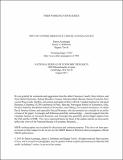Why Do Voters Dismantle Checks and Balances?
Author(s)
Acemoglu, Daron; Robinson, James A.; Torvik, Ragnar
DownloadAcemoglu_Why do.pdf (550.2Kb)
OPEN_ACCESS_POLICY
Open Access Policy
Creative Commons Attribution-Noncommercial-Share Alike
Terms of use
Metadata
Show full item recordAbstract
Voters often dismantle constitutional checks and balances on the executive. If such checks and balances limit presidential abuses of power and rents, why do voters support their removal? We argue that by reducing politician rents, checks and balances also make it cheaper to bribe or influence politicians through non-electoral means. In weakly institutionalized polities where such non-electoral influences, particularly by the better organized elite, are a major concern, voters may prefer a political system without checks and balances as a way of insulating politicians from these influences. When they do so, they are effectively accepting a certain amount of politician (presidential) rents in return for redistribution. We show that checks and balances are less likely to emerge when the elite is better organized and is more likely to be able to influence or bribe politicians, and when inequality and potential taxes are high (which makes redistribution more valuable to the majority). We also provide case study evidence from Bolivia, Ecuador, and Venezuela consistent with the model.
Date issued
2013-02Department
Massachusetts Institute of Technology. Department of EconomicsJournal
Review of Economic Studies
Publisher
Oxford University Press
Citation
Acemoglu, D., J. A. Robinson, and R. Torvik. “Why Do Voters Dismantle Checks and Balances?” The Review of Economic Studies 80, no. 3 (February 26, 2013): 845–875.
Version: Original manuscript
ISSN
0034-6527
1467-937X